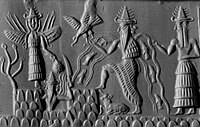Uttu
| Part of a series on |
| Ancient Mesopotamian religion |
|---|
 |
|
|
Uttu is an ancient Sumerian goddess associated with weaving.[1] The same cuneiform symbol used to write her name was also used to write the Sumerian word for "spider",[1] indicating that Uttu was probably envisioned as a spider spinning a web.[1] She appears primarily in the myth of Enki and Ninsikila, in which she resists the sexual advances of her father Enki by ensconcing herself inside her web, but he convinces her to let him in using a gift of fresh produce and the promise that he will marry her. Enki then intoxicates her with beer and rapes her. She is rescued by Enki's wife Ninhursag, who removes Enki's semen from her vagina and plants it in the ground, resulting in the growth of eight new plants, which Enki later eats.
Mythology[]
Enki and Ninsikila[]
In the version of Enki and Ninsikila from Nippur, Uttu is the daughter of Enki and Ninkurra,[2] but, in another version, Ninkurra instead gives birth to Nin-imma,[2] who mates with her father Enki and gives birth to Uttu as a result.[2] Uttu matures and becomes "shapely and decorous".[2] Enki's wife Ninhursag warns Uttu that Enki will try to seduce her, as he has done with all his other daughters.[2] Uttu fortifies herself inside her web and, when Enki comes to seduce her, she forces him to promise that he will marry her before she will have sex with him.[2] As marriage gifts, Uttu demands that Enki give her fruits and vegetables.[2] Enki finds a gardener, who demands that, in exchange for the fruits and vegetables, Enki must fill his irrigation ditches with water.[2] Enki fills the ditches and the gardener gives him the produce.[2]
Enki brings the produce to Uttu, who happily admits him into her web,[2] but Enki gives Uttu beer to make her drunk and then rapes her.[2] Uttu screams and Ninhursag comes to rescue her.[2] Ninhursag removes Enki's semen from Uttu's vagina and plants it in the ground,[2] causing eight plants to rise.[2] Later, Enki sees the plants and is annoyed because he does not recognize them.[2] Isimud, Enki's sukkal, or personal attendant, arrives, names each of the plants, and gives them to Enki to eat.[2] The account ends with the declaration that "Enki determined the nature of the grasses" and "had them know it in their hearts."[2]
Family tree[]
| Abzū | |||||||||||||||||||||||||||||||||||||||||||||||||||||||||||||||||||
| Mummu | Tīamat | ||||||||||||||||||||||||||||||||||||||||||||||||||||||||||||||||||
| Laḫmu | Laḫamu | ||||||||||||||||||||||||||||||||||||||||||||||||||||||||||||||||||
| Anšar | Kišar | ||||||||||||||||||||||||||||||||||||||||||||||||||||||||||||||||||
| An | |||||||||||||||||||||||||||||||||||||||||||||||||||||||||||||||||||
| Ninḫursaĝ | Enki born to Namma | Ninkikurga born to Namma | Nidaba born to Uraš | Ḫaya | |||||||||||||||||||||||||||||||||||||||||||||||||||||||||||||||
| Ninsar | Ninlil | Enlil | |||||||||||||||||||||||||||||||||||||||||||||||||||||||||||||||||
| Ninkurra | Ningal maybe daughter of Enlil | Nanna | Nergal maybe son of Enki | Ninurta maybe born to Ninḫursaĝ | Baba born to Uraš | ||||||||||||||||||||||||||||||||||||||||||||||||||||||||||||||
| Uttu | Inanna possibly also the daughter of Enki, of Enlil, or of An | Dumuzid maybe son of Enki | Utu | Ninkigal married Nergal | |||||||||||||||||||||||||||||||||||||||||||||||||||||||||||||||
| Meškiaĝĝašer | Lugalbanda | Ninsumun | |||||||||||||||||||||||||||||||||||||||||||||||||||||||||||||||||
| Enmerkar | Gilgāmeš | ||||||||||||||||||||||||||||||||||||||||||||||||||||||||||||||||||
| Urnungal | |||||||||||||||||||||||||||||||||||||||||||||||||||||||||||||||||||
References[]
| Wikiquote has quotations related to: Uttu |
Bibliography[]
- Black, Jeremy; Green, Anthony (1992), Gods, Demons and Symbols of Ancient Mesopotamia: An Illustrated Dictionary, London, England: The British Museum Press, ISBN 0-7141-1705-6
- Jacobsen, Thorkild (1987), The Harps that Once--: Sumerian Poetry in Translation, New Haven, Connecticut: Yale University Press, ISBN 0-300-07278-3
- Mesopotamian goddesses
- Crafts goddesses
- Textiles in folklore
- Mythological spiders
- Middle East mythology stubs

